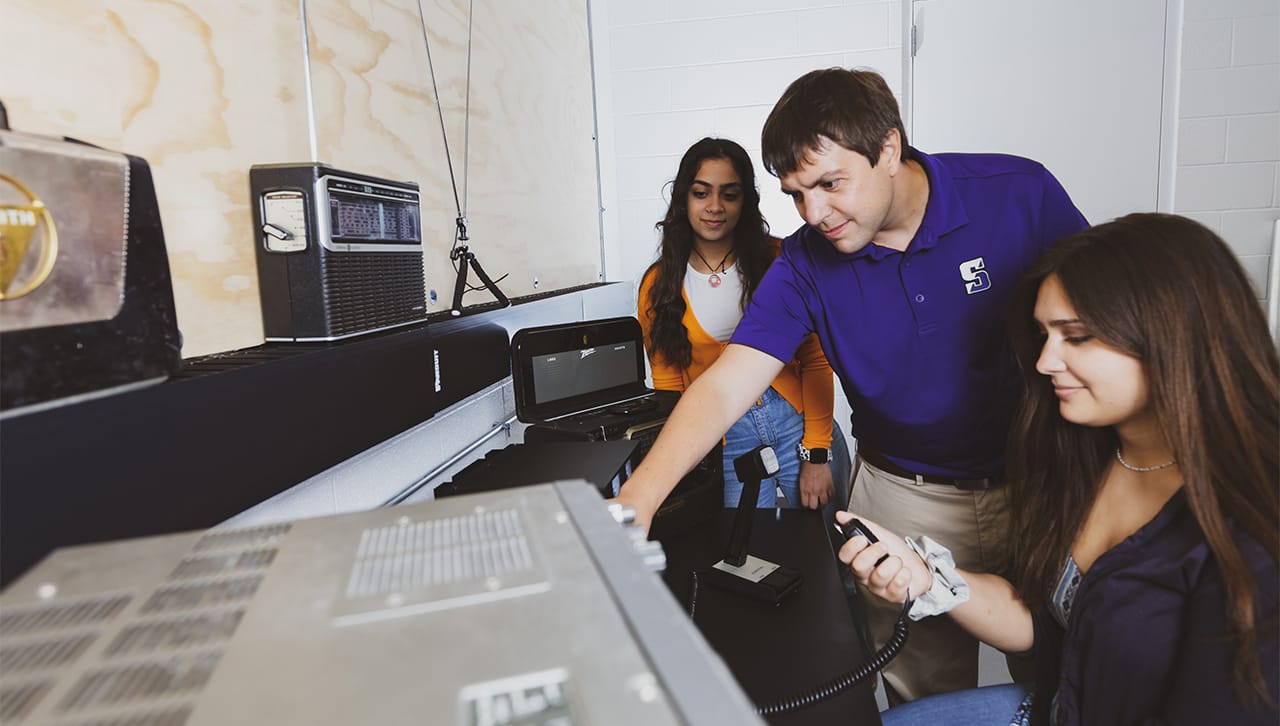Physics Professor Awarded NSF Grant for Workshop

The National Science Foundation (NSF) awarded a grant of nearly $50,000 to Nathaniel Frissell, Ph.D., assistant professor of physics and electrical engineering at The University of Scranton. The grant will support “The Ham Radio Science Citizen Investigation (HamSCI) 2022 Workshop,” which will take place March 18 and 19 at The U.S. Space and Rocket Center in Huntsville, Alabama. The conference, which will take place in-person, also has a virtual format option.
The Ham Radio Science Citizen Investigation (HamSCI) is a collective of professional researchers and licensed amateur radio operators (a.k.a. hams) with the objective to foster collaborations between the amateur and professional communities for the purposes of advancing scientific research and understanding, encouraging the development of new technologies to support this research, and to provide educational opportunities for the amateur radio community and the general public.
The workshop will serve as a team meeting for the HamSCI Personal Space Weather Station project, which is a $1.3 million NSF funded project previously awarded to Dr. Frissell. The project seeks to harness the power of a network of licensed amateur radio operators to better understand and measure the effects of weather in the upper levels of Earth’s atmosphere.
The theme for the two-day HamSCI workshop is “The Weather Connection.” The fifth annual workshop will feature prominent leaders in space weather, atmospheric weather and the connection between them.
Speakers include a keynote presentation by Chen-Pang Yeang, Sc.D., Ph.D., associate professor at the Institute for the History and Philosophy of Science and Technology, University of Toronto and author of “Probing the Sky with Radio Waves: From Wireless Technology to the Development of Atmospheric Science.” He will discuss “Ham Radio and the Discovery of the Ionosphere.” Tamitha Skov, Ph.D., research scientist in the Physical Sciences Laboratory Aerospace Corporation, will discuss the ionospheric impacts of space weather. Dr. Skov is well-known to the amateur radio community as “The Space Weather Woman” through her innovative YouTube space weather forecasts. Jim Bacon, a well-known retired meteorologist from the United Kingdom and active developer of the PropQuest website, will provide an amateur radio tutorial on the influences of terrestrial weather on radio propagation and the ionosphere.
“The workshop series has led to cutting-edge work in the fields of space physics, citizen science, and the use of crowd-sourced ionospheric data,” said Dr. Frissell. “To maximize the potential of the ham radio-professional researcher relationship, meetings are needed to bring these groups together to learn about each other’s communities, vocabularies, share ideas, and participate in activities that advance both the scientific field and the radio hobby.”
Dr. Frissell’s research focuses on the ionosphere, which is an atmospheric region that extends from about 50 to 600 miles above the earth’s surface. According to Dr. Frissell, changes in the ionosphere alter the behavior of radio wave propagation and greatly affect the radio communications and global navigation satellite systems. Understanding ionospheric structures and processes will lead to an increased understanding and prediction of these effects.
In August 2021, Dr. Frissell received a six-figure grant through the NASA’s Space Weather Applications Operations 2 Research Program for the research project “Enabling Space Weather Research with Global Scale Amateur Radio Datasets.”
The location of the 2022 conference near the NASA Marshal Space Flight Center.
Registration for the HamSCI Workshop 2022 will open soon. Registration and additional information about the conference can be found on the HamSCI Workshop 2022 webpage.






